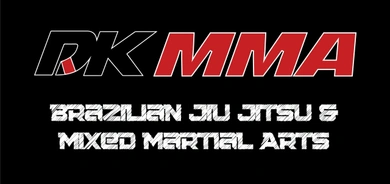Tips for BJJ Beginners
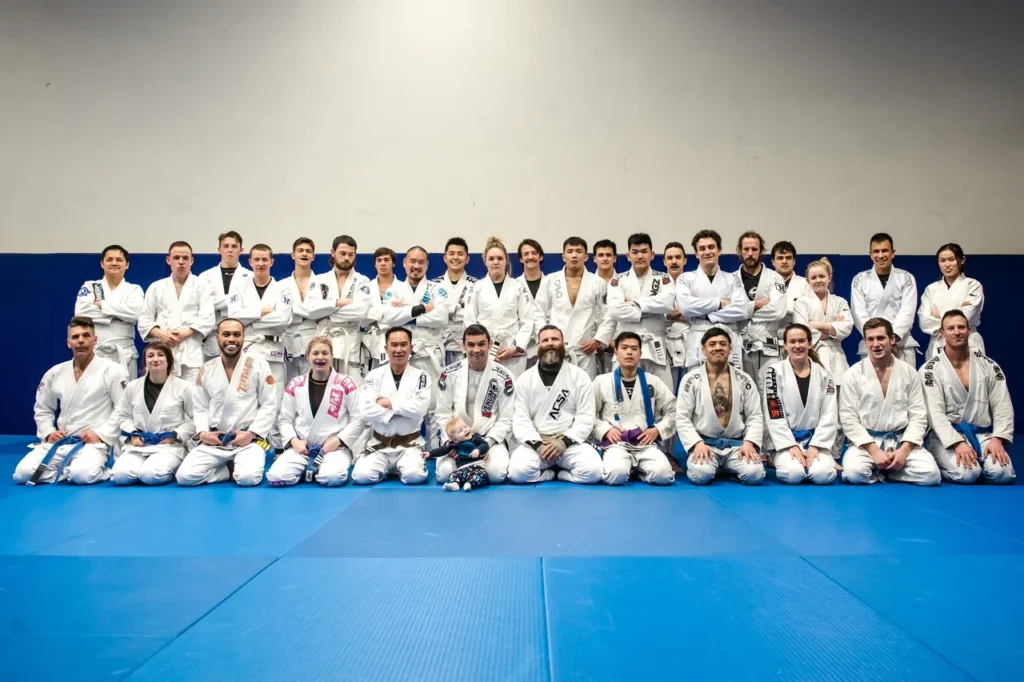
White belt is the make or break stage in your Martial Arts journey. BJJ has a very high drop off rate and the majority of people who begin training don’t make it past the three month mark. There are a variety of reasons for this but quite commonly students quit because they feel they are not making any progress.There are several common problems that I see with most beginner students and in this article I will offer possible solutions that will help you improve and make progress in your martial arts journey Some Beginners will never suffer from these problems, particularly so if they are athletic or have a background in other combat sports. They may not get exhausted or stuck in bad positions when rolling with other beginners, however, I think its actually beneficial for students to go through this frustrating process and to get used to it. This is something you will have to experience again and again throughout your training career. The sooner you can get comfortable with being uncomfortable the more benefits you will get in the long term. Gassing Out… The first problem for many beginners is lack of fitness leading to exhaustion during sparring. Don’t base your entire BJJ game around fitness and outworking your opponent at the expense of proper technique, however, it will always help to improve your fitness if you feel you are struggling during sparring rounds.To achieve this I recommend simple solutions such as getting up half an hour earlier and going for a run, bike ride or swim twice a week. Yes there are more scientific and technical ways of maximizing your fitness but as a White Belt you aren’t trying to win the Olympics just attempting to build your gas tank so you can roll at a sensible pace without feeling completely exhausted and having to sit out rounds. Another tip to avoid gassing out is to make sure you roll at a pace that is suitable for your fitness level. If you find you are breathing heavily and exhausted within 30 seconds you need to slow down and concentrate on what you are doing. Don’t waste energy relentlessly squeezing your opponents head when you should be figuring out how to move your hips and legs to escape. Getting Stuck in Bad Positions… This is one of the most common questions I get asked by beginners. They get stuck under side control or Mount for every round of sparring and never get a chance to use any of the techniques they have learnt.My first piece of advice is to learn and drill the escapes from these positions then practice them in isolation sparring. This involves rounds of starting from side control and once you achieve an escape or reversal resetting and doing it again. This method will improve your escapes 100%.Another useful idea is to occasionally just ask your training partners to reset once you’ve been stuck under side control or mount. Getting better at escaping especially against heavier and more skilled opponents is a time consuming process and you can’t expect results overnight. For this reason I would advise new students to just ask their training partners to reset in a different position and work from there rather than wasting valuable training time.At a slightly higher level the biggest key to avoiding getting stuck in bad positions is to avoid ending up there in the first place. The key to this is Guard Recovery and Guard Pass Prevention. The better you get at preventing getting your guard passed the less time you will be spending in bad positions. As mentioned previously this is a long term process but the earlier in your grappling career you get started on it the better results you’ll get.I discuss the difference between training and competition in this Article Can’t get any Submissions… Another problem is that the typical BJJ student learns or is at least exposed to dozens of submissions in their first few months of training but when they try to apply these techniques in live sparring they never work. This is because all the other students have also been taught the same techniques during the same period and so they are aware of them and are ready to shut them down. This often leads to the less than ideal ‘Youtube Arms-Race’ scenario where ambitious White-belts will scour the internet for secret techniques to catch their training partners unawares rather than just focusing on learning how to do the fundamental techniques properly.I advise beginners to follow the BJJ maxim – ‘Position before Submission’. Focus on building your game, at least in the early stages, of getting to solid control positions such as Side Control, Mount and Back Control and then the opportunities for submissions will begin to present themselves. I also encourage building your game around submissions where you will not lose position if it doesn’t get the tap. For example if you cant finish the Rear Naked Choke you are still in Back Control so you get to try it again and again until the end of the round. Can’t remember their techniques when Sparring… As previously mentioned during your first few months of training you will be exposed to what seems like an endless amount of techniques. It is usually too difficult to remember everything you learn and it will be almost impossible to recall and use it effectively when needed in live sparring.The first stage in the solution to this problem is to try to retain as much information as possible. Make notes on everything you learn as soon as possible after learning it. Drill the technique as much as possible after your Instructor shows it then try to drill it again a few times later in the class e.g. before each sparring round or a few reps at the end of class. This will help keep it fresh in your memory. Its also a great idea if you get to class early to grab a
Building A Good Team
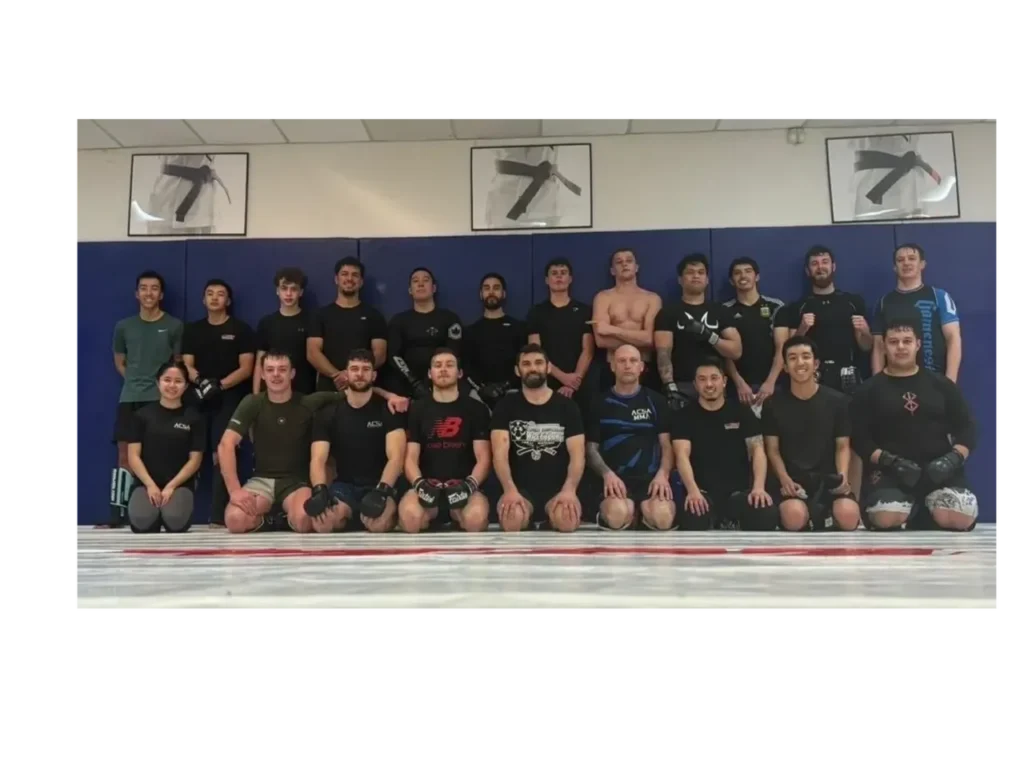
There are two main roles for a BJJ or MMA coach. First teaching the techniques, tactics, and strategies of BJJ & MMA and second creating the correct training environment for students to improve. Most aspiring coaches myself included focus on the first part. They think I will be a more successful coach if I can learn as many moves as possible or memorise as many details or intricacies about those techniques. It certainly helps to have a deep knowledge and understanding of the sport but over the years I’ve realized that the second skill is more important. The aspiring student needs instruction from a qualified coach but more importantly, they need access to good training partners in order to improve. Good training partners enable you to improve and reach your potential. My number one role as a coach is to create a room full of good training partners. This is easier said than done and requires constant supervision and improvement. Over the years I’ve realised that it comes down to ‘getting the right people on the bus and getting the wrong people off the bus’. Make sure that everyone in the room has the same goals and objectives with their training. Just a few lazy students or people with the wrong attitude can cause problems for everyone. It’s easy to just turn a blind eye but the coach’s job is to call out the wrong types of behaviour and uphold the expected standard. As a coach you can’t be everyone’s best mate but if you want to get results in your training you need coaches who are willing to make the tough decisions that are in the best interests of the team.
Start your MMA Journey today! Beginners MMA Training
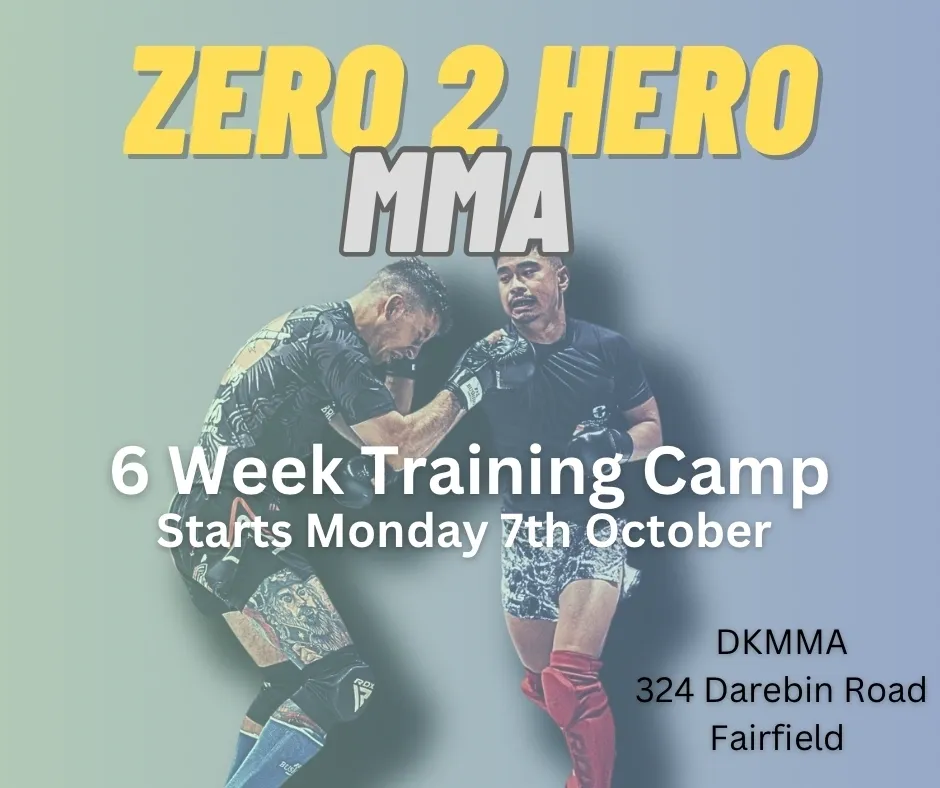
Always wanted to LEARN MMA and test yourself in competition? Here is your opportunity! The Zero 2 Hero 6-Week MMA Training Camp is back! Contenders will train in five sessions per week for 6 weeks learning the fundamental skills of Mixed Martial Arts. 📷 Start Date is Monday 7th October! They will then fight on our Bushido Amateur MMA event at the end of the program. The matches are held under a modified ruleset, allowing the participants to gain valuable experience while minimizing the risk of injury. This program is limited to Ten Participants. 📷 We are now taking bookings for the next Contenders program. This course is suitable for complete beginners of all fitness levels. Once you complete the course you will be given an opportunity to compete in our Bushido Amateur MMA competition. WHAT DO YOU GET? 📷 6 weeks of training 5 times a week! 📷 High-level coaching in BJJ & MMA from our highly experienced team! 📷 MMA Training uniform! 📷 Train alongside our current competition team! 📷 Opportunity to Compete in Bushido Amateur MMA! WHO CAN JOIN? We are only taking 10 contenders! Open to people of any skill and fitness level. Ideal if you have done zero or very little training before. ================================= What are you waiting for? Book your Spot here : MMA Training Melbourne Beginners MMA Training
The importance of your BJJ Team to maximise your Training
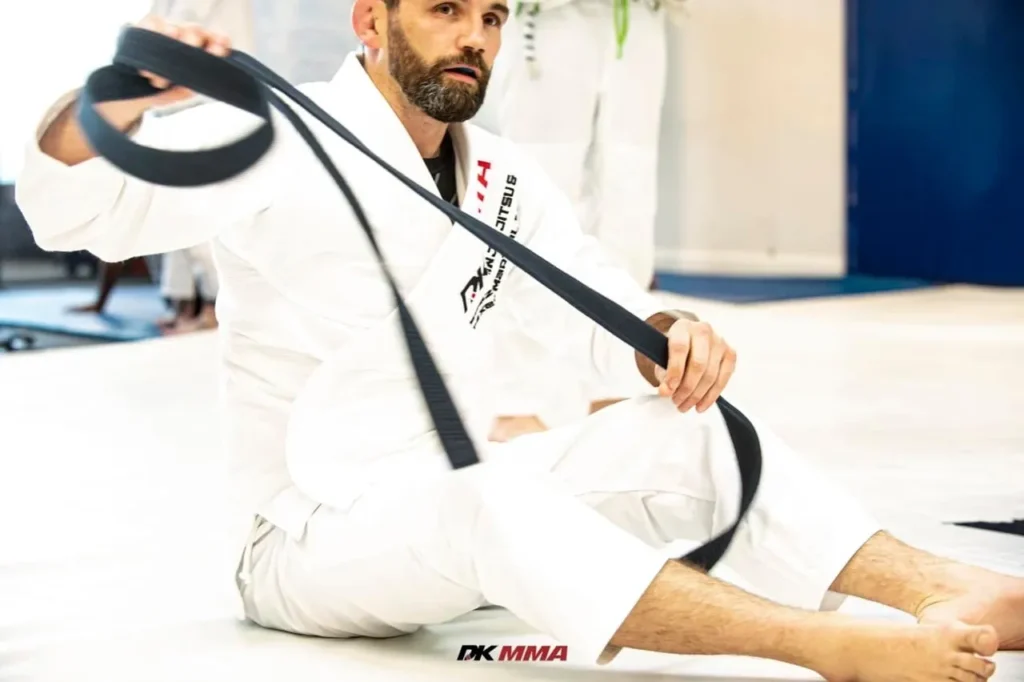
One of the recent trends I’ve noticed is a lot more BJJ students bouncing around from gym to gym. Back in the day, most people stuck with the first team they joined. That was partly because there were fewer gyms to choose from, and the culture in BJJ was more like a tight-knit community—almost like a tribe. But these days, it seems like people switch gyms every 6 to 12 months, and that’s becoming more common. Now, don’t get me wrong—there’s nothing wrong with switching gyms if there’s a good reason. Maybe your first gym is a disaster with a coach who isn’t legit—someone who’s always late or showing up drunk. Or maybe your gym closes down, and you have no choice but to find a new place. There are plenty of valid reasons to change gyms.But what I’ve noticed more and more is that a lot of people aren’t switching gyms for those kinds of reasons. Instead, they’re doing it because of what’s blowing up on social media. They train at one gym for a year or so, then see another gym getting a ton of likes on Instagram and decide to jump over there. A year later, when the hype fades, they’re already looking for the next trendy gym to check out. This behavior is driven by FOMO (fear of missing out) more than anything. Instead of focusing on improving their skills, they’re more concerned with being part of whatever is hot right now. It’s all about the buzz, not the actual progress. As a coach who’s been in BJJ for over 25 years, I get it—sometimes you need a change, or maybe you want to try something new. But from what I’ve seen, constantly switching gyms isn’t usually the best way to get better. To really succeed in BJJ, you need a coach who’s willing to invest time in you and help you improve. And that’s hard to do if the coach doesn’t think you’re sticking around long enough to make real progress. It’s tough to build a strong relationship with a coach if you’re jumping around every year, and without that trust and consistency, it’s hard to get the results you’re after. So, if hopping from gym to gym and chasing the latest social media trend is your thing, that’s cool. But if your goal is to actually get better at BJJ, you’re better off finding a gym where you can settle in, build relationships, and work closely with a coach who’s invested in your development. BJJ Training Melbourne
Why Fighters must train in regular classes MMA Training Melbourne
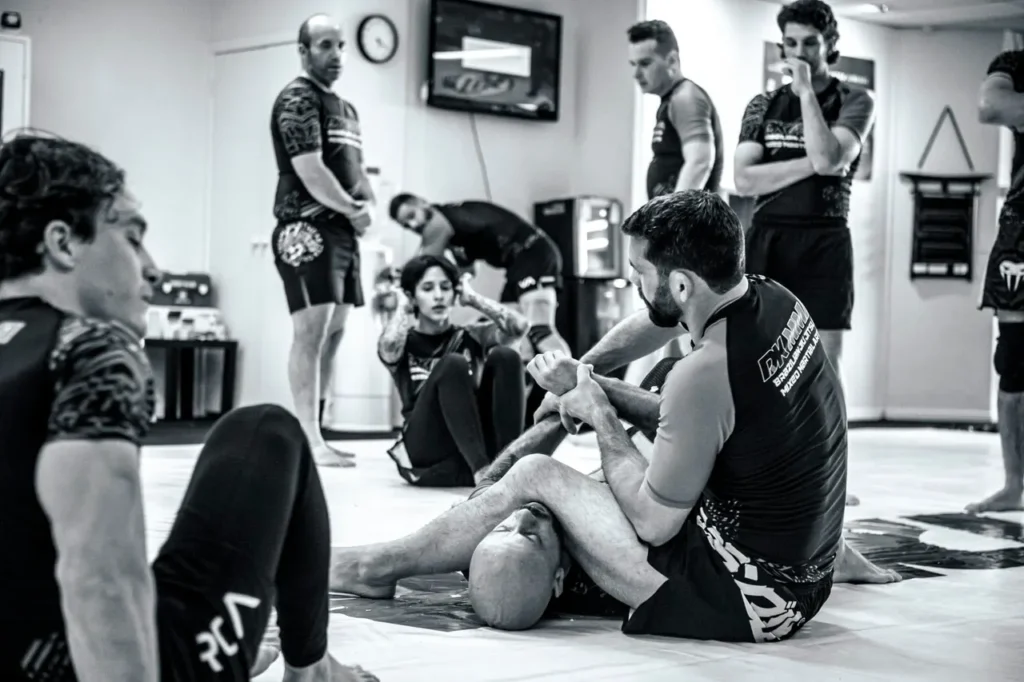
Why do some MMA fighters have successful careers while others start off well but then quickly go downhill? I’ve seen fighters have a lot of success early in their career, then they stagnate, they stop improving and gradually get worse and worse results. How can we explain this deterioration of skill level and results? There are several factors that can have a bad long term effect on a fighters career. The Fight Camp Problem: One common thing I see with many fighters is that once they have a little bit of success they stop attending regular classes and instead just want to do their own fight training, They just want to do their own padwork and sparring rather than attending classes like the regular students, They see top professionals like Floyd Mayweather training like this so they assume that’s what they should be doing too. They also think they’ve become too good to train with the regular students and that all the training should be focused around them and their competition goals, The reality is that if you are already an elite world champion like Mayweather then it makes sense not to do regular classes. There’s a point of diminishing returns, time is better spent doing training that is solely focused on you. Also, if you are already a world champion you can afford to pay your trainers and sparring partners a full time salary so they can work around your schedule, Why do fighters think they don’t have to come to regular classes? They think that training in the regular classes with non fighters will hold them back. This is not true. I have seen many recreational students who have a much higher skill level in specific areas than the professional fighters. The fighter would actually benefit tremendously from training and sparring with these non fighters. They believe training should be all just focused around them, This is completely unrealistic, Even if the fighter is paying his trainer 10-20% of the fight purse, it is very unlikely that any decent or suitably qualified trainer will be willing and able to devote all their time over the course of an 8 week training camp. They think they already know everything that’s being taught in class so there’s no point wasting time practicing it again. This is usually never the case. There is always more to learn and more skills to be refined and improved upon. Disadvantages of only doing fight training: There are several common patterns which I notice from fighters who only do ‘Fight Camps’ rather than regular training. These include stagnation and deterioration of ability. The fighter is happy in the short term because he gets to train on his own terms. It’s all about him, he feels like a professional and builds his ego but it’s a disaster long term, The fighter may be able to maintain their current level of skill, technique and fitness but is not improving and will not be capable of beating the next level of opponent. The fighters coach who was probably responsible for the initial success doesn’t want to work with the athletes who don’t attend his classes regularly as this sets a bad example to the other students. This often leads to the fighter finding other coaches who are willing to work them but usually the replacement coaches are inexperienced and just trying to make a name for themselves which will ultimately do more harm than good to the fighters career. Why should fighters keep training in classes? Its very important to continually keep improving and updating your skills. MMA fighting is a game of levels. If you beat a fighter of one level then you will have to move up to the next level to keep progressing your fight career. The level of skills and ability that was required to beat your previous opponent will not be enough to beat your next opponent. This is especially the case in the sport of Mixed Martial Arts where the overall skill level rapidly increases from year to year. The level of skill required to win a state or national title even a few years ago would likely not be enough now. MMA Training Melbourne mma classes melbourne
Learning BJJ without getting Injured BJJ Training Melbourne
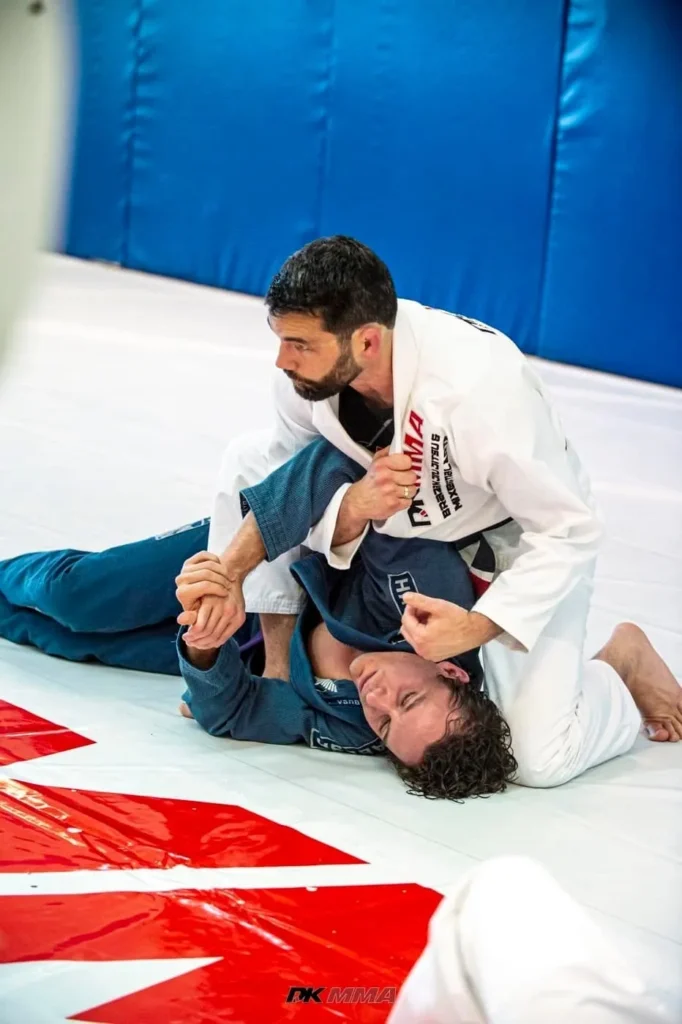
If you’re frequently getting injured in BJJ, you’re probably doing something wrong. BJJ is one of the safest martial arts, although some people are more injury-prone than others.BJJ comes from Judo, which was itself based on Japanese Jiu-Jitsu. Judo was created by removing dangerous techniques from traditional Jiu-Jitsu to make it safer and more practical for full-resistance training. The goal was to make sure people could train at a high level of resistance to improve their skills. When Judo spread to Brazil, the Brazilians made it even safer by focusing more on the ground game, where injuries were less common, and reducing the emphasis on standing techniques, which are more injury-prone. This led to the creation of Brazilian Jiu-Jitsu. What sets BJJ apart from other martial arts is that you can spar or “roll” using full resistance, without risking serious injury. This allows you to learn and improve quickly. Brazilian Jiu-Jitsu is one of the few martial arts where you can practice techniques at full intensity during training without risking injury to your partner. You can apply a chokes and armlocks exactly as you would in a competition or real fight, and your partner will tap out once it’s fully locked in (if they’re smart).This level of realism isn’t possible in other martial arts with kicks to the head or elbows to the face—no matter how much you practice them, you’ll never fully know what it feels like to land them until you’re in an actual fight. In sparring, you’re always holding back. This is what makes BJJ so effective: you get to practice techniques for real, against resisting training partners, every day. In contrast, many other martial arts spend a lot of time teaching techniques that are too dangerous to use in sparring with teammates. As a result, the first time you apply them at full intensity might be in an actual fight, which can be risky. Don’t push too hard too often. If you’re caught in a submission and can’t escape,you should be smart enough to recognize the danger, tap out and ask for feedback, instead of trying to power out of it. Your training partner won’t be impressed by your strength or stubbornness; they’ll appreciate you taking the time to learn proper technique. BJJ Training Melbourne
Real BJJ & MMA Coaching MMA Training Melbourne
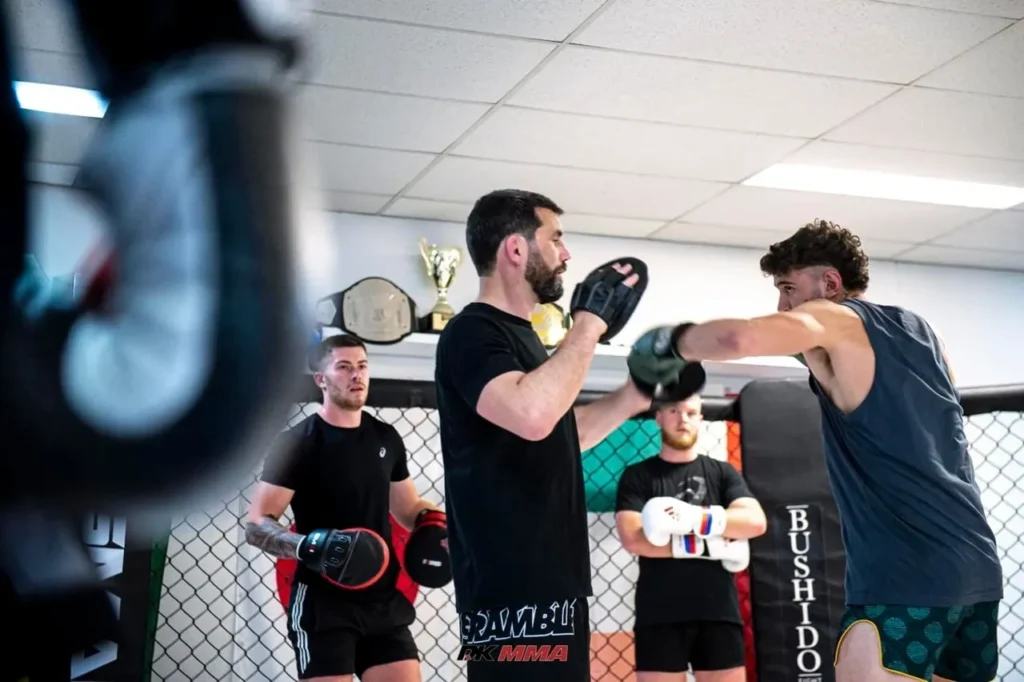
Being a good coach goes beyond teaching techniques—it’s about pushing people to reach their full potential. Teaching the moves is the easy part; motivating and challenging people to do what I know is necessary to improve can sometimes be very draining. Sometimes I feel guilty pushing students to compete, especially those who show little interest in it. But over time, I’ve realized that competition is one of the fastest ways for anyone to improve. I remind myself that my job is to help students grow. I can’t do that by always making things comfortable. The real job of a coach is to encourage students to step outside their comfort zones and challenge themselves. It’s easy to motivate people by telling them they’re improving , but that kind of positive feedback only lasts so long. To see real, lasting improvement, students need concrete evidence of their growth, and that only comes through pushing their limits. This is the most important lesson I’ve learned as a coach: it’s not just about showing students the right techniques. The most valuable thing I can do is help them believe in themselves and push past their limits to reach their true potential. MMA Training Melbourne
Real MMA Training MMA Training Melbourne
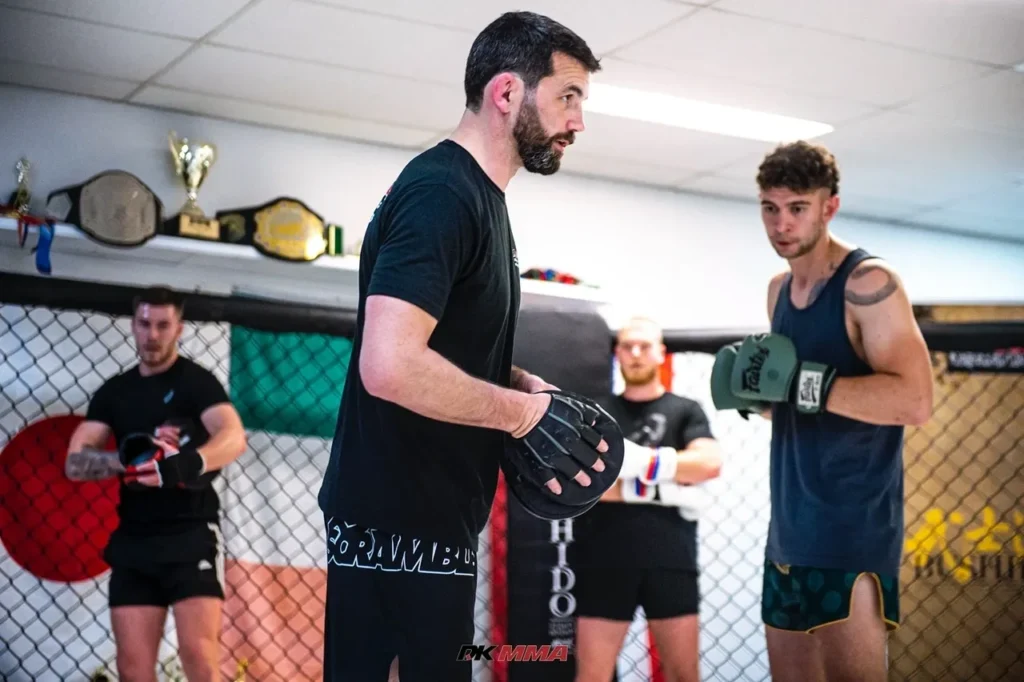
If you want to become a UFC champion, don’t train like one. Despite having more access to information than ever, I still see many fighters early in their careers making the same mistakes. It’s the “UFC Countdown” curse. Back when I was fighting, we didn’t know how to train for MMA. We figured things out by watching videos, reading a few books, and experimenting. Then UFC Countdown came along, but let’s face it—MMA training is not glamorous. Now, with social media, there’s more pressure to create flashy content to attract views. Boring training videos don’t rack up likes on Instagram, and TikTok dances get more attention than grueling workout sessions. But here’s the hard truth: you don’t win fights by chasing likes or posting viral videos—you win them by putting in years of disciplined, consistent training. Don’t focus on what a fighter is doing today. Look at what they were doing 10 or 15 years ago that built the foundation of their success. They were probably doing back to back JiuJitsu classes, hours of bag work, sparring and strength and conditioning with no one videoing it or choreographing it to look good. That’s what got them to the elite level. The training they’re doing now might be the reason they won’t be the champion next year. MMA Training Melbourne
What I’ve learned as an MMA coach MMA Training Melbourne
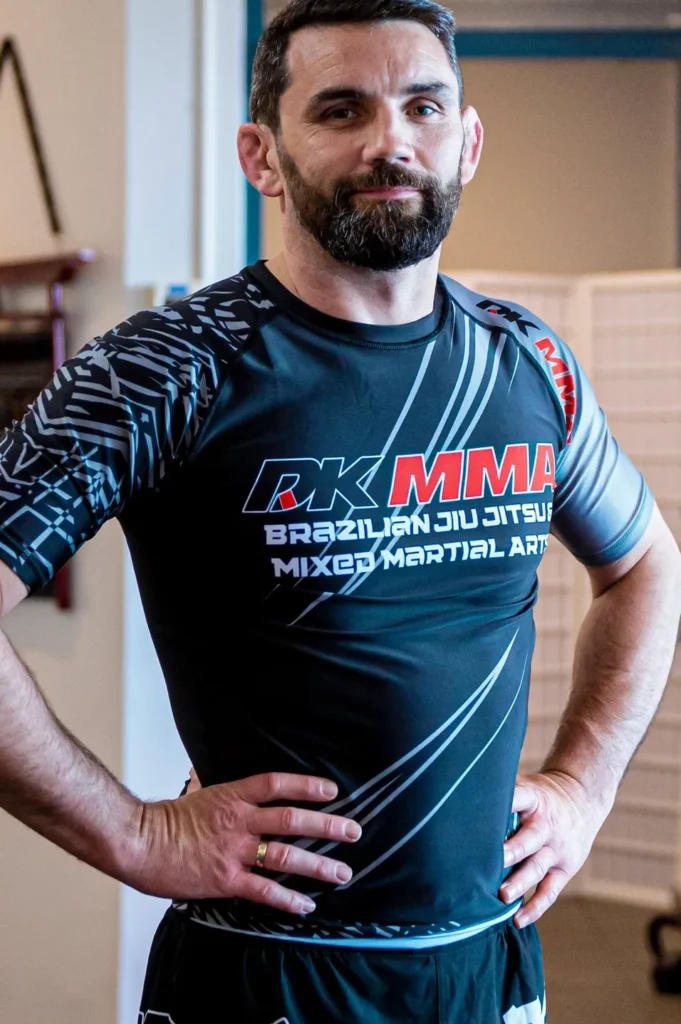
What I’ve learned as an MMA coach These are some of the things I’ve picked up on my first ten years as an MMA Coach You don’t need to be a Fighter. Before becoming a coach I believed that I needed to gain as much fight experience as possible. In my mind it would affect my credibility if I hadn’t been there and done it. Since opening my school I’ve never had a single student who cares if I had real fight experience or not. The only thing that students care about is whether you will be able to help them achieve their goals. Fight Experience can be useful and is helpful for separating the legitimate coaches from the frauds but many experienced fighters are clueless when it comes to coaching and don’t take the time to learn how to coach properly. No Substitute for Experience. However, my own fight career has been a useful asset for me. My experiences in the ring and cage have given me confidence in preparing fighters and an ability to understand what they are going through during their preparation. I can help my fighters avoid making the mistakes that I made during my fight career. This speeds up their learning and progression rather than relying on trial and error. I am also confident that I am not asking my fighters to do anything that I haven’t done myself. Trustworthiness is one of the most valuable attributes a coach can have. The fighter must be able to trust the coach 100% rather than doubting if he is actually speaking from experience. Wide Knowledge Base. What you learnt during your own training and fighting won’t be enough. Every Fighter has their favourite techniques that have worked well throughout their competitive career. When you start coaching you encounter a wide variety of students of different skill levels, personalities and body types for whom these techniques just aren’t a good fit. Students will get bored of learning your ‘A game’ every night for the next five years. You need to go back and re-learn many techniques and skills that you didn’t pay too much attention to when you were a fighter. You need to understand them so you can pass them onto your students. You also need to invest time in learning how to coach properly and be aware of the distinction between demonstrating how much you know versus passing on the information in a useful manner. Always Keep Learning. Don’t keep looking back to the glory days. MMA is continually getting better and more advanced and a good coach needs to keep learning and improving. Some martial arts styles haven’t changed much in the past 50 years however MMA and BJJ are continually evolving and changing, A good coach must keep up to date with new techniques so that students are not caught off guard by them, Too many coaches rely on just teaching the way they were taught. All sports evolve and improve over time and combat sports are no different. It makes sense to continually stay on top of the latest developments in the sport just as an athletics or football coach would. Martial Arts Trends come and go. There will always be new fads or new trends in the industry. Since gaining popularity in the western world Martial Arts has a history of going through trends where one style would be popular for a few years and then replaced by another. This was the case with Judo, Kung Fu, Karate and then Ninjitsu. MMA & BJJ are currently the biggest trend in the martial arts world. BJJ is actually a microcosm of this Martial Arts trend phenomenon where we see a new group of techniques become popular for a few years before being replaced by something else. Based on this I believe you need to be aware of the current trends in the industry but focus on the term long term rather than basing your entire coaching philosophy around whatever happens to be popular at the moment. The Right Culture and Training Environment. As mentioned previously, a good coach must stay on top of the latest developments in in the sport, however, Trends come and go. What is relevant and popular this year may soon be seen as an old fashioned technique that nobody uses anymore. What can persist for a much longer time is the gym culture that you create. The atmosphere and culture in your gym is the most important asset. How the students and fighters act, treat each other and behave in the gym. The training environment you create in terms of safe and effective training, and the reputation and the values of the team are more important than short term success. Coaching Beginners is more Impressive than Coaching Champions. Anyone can coach a fighter who is already a champion. By the time they reach Championship level the fighter should already have spent ten thousand hours training. It becomes more a matter of supervising their training and making sure they don’t do anything stupid. What impresses me most is when a coach can take a complete beginner with no skill or training background and get them to championship level. The Team is more Important than the Individual Fighters. Obviously it is always more rewarding to work with a fighter from beginner level all the way up to championship level but this is not always possible. Fighters will switch gyms, lose interest in fighting or quit training altogether but its not a big deal. Every top level professional sports team has players leave every season, every college or high school has to start off each year with a fresh batch of players. If the right systems, culture and coaching are in place then the team will consistently produce results. Focus on Quality over quantity. Some people aren’t a good fit and will do more harm than good. Many coaches think that the more people they can ram into their classes or
DKMMA Zero 2 Hero MMA Training Camp MMA Training Melbourne
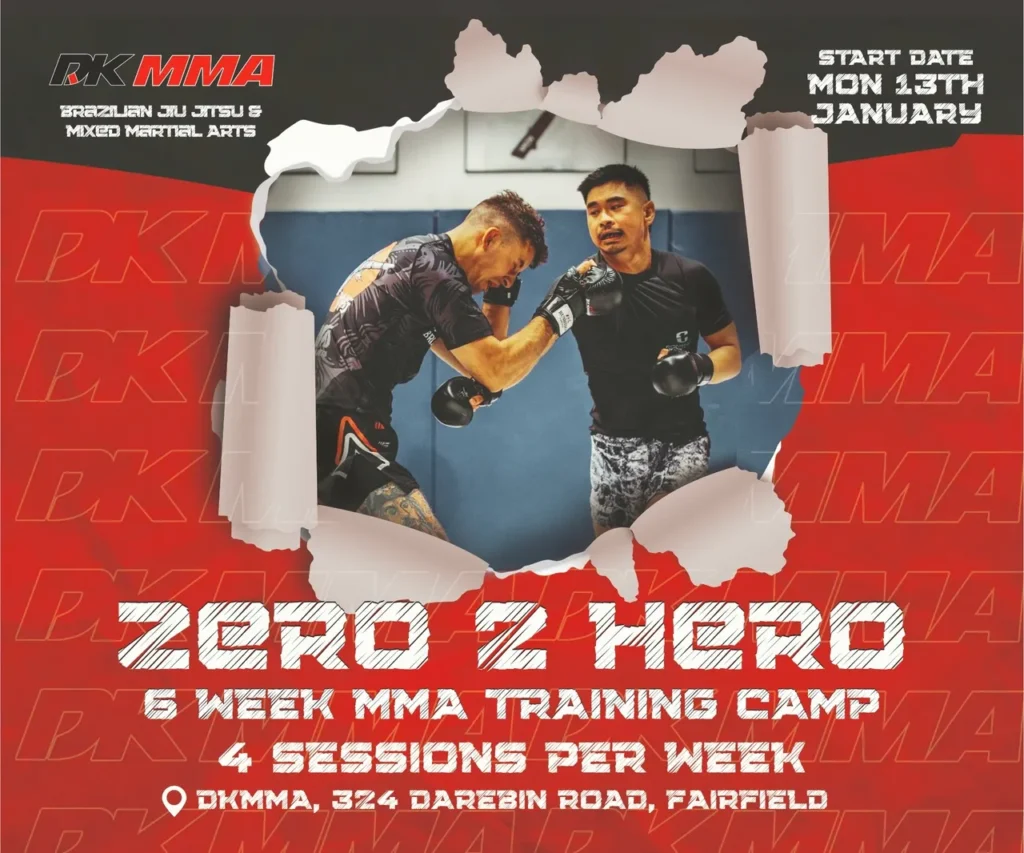
Always wanted to LEARN MMA and test yourself in competition? Here is your opportunity! The Zero 2 Hero 6 Week MMA Training Camp is back! Contenders will train in 4 sessions per week for 6 weeks learning the fundamental skills of Mixed Martial Arts. 📷 Start Date is Monday 13th January! They will then fight on our Bushido Amateur MMA event at the end of the program. The matches are held under a modified ruleset which allows the participants to gain valuable experience while minimising the risk of injury. This program is limited to 12 Participants. 📷 We are now taking bookings for the next Contenders program. This course is suitable for complete beginners of all fitness levels. Once you complete the course you will be given a opportunity to compete in our Bushido Amateur MMA competition. WHAT DO YOU GET? 📷 6 weeks of training 4 times a week! 📷 High level coaching in BJJ & MMA from our highly experienced team! 📷 MMA Training uniform! 📷 Train alongside our current competition team! 📷 Opportunity to Compete in Bushido Amateur MMA! WHO CAN JOIN? We are only taking 12 contenders! It is open to people of any skill and fitness level. Ideal if you have done zero or very little training before. ================================= What are you waiting for? Book your Spot here : MMA Training Melbourne mma gym Melbourne best mma gyms melbourne
